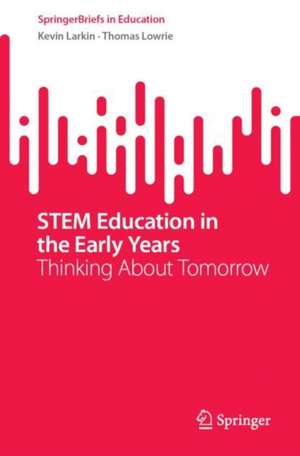STEM Education in the Early Years: Thinking About Tomorrow
Autor Kevin Larkin, Thomas Lowrieen Limba Engleză Hardback – 31 aug 2022
This book analyses and synthesises past and current approaches to STEM Education in the Early Years, particularly the role of digital technologies and play based pedagogies, and provides a look forward to a new way of conceiving STEM Education. It presents a literature review of existing best practice in STEM education, both in Australia and internationally. It also presents theoretical and pedagogical discussions that outlines a new approach to STEM Education, based on a four-year, longitudinal, Early Years project. It provides educational frameworks for educators' use to enhance student learning in STEM, both in formal school contexts and beyond.
This book focuses on a number of core themes in the research literature, including STEM education policy (nationally and internationally); the economic, social and political implication of STEM Education; the nexus between digital technologies, STEM, and play based pedagogies; the confidence and competenceof early childhood educators and their professional development requirements; STEM education beyond formal schooling; and a new pedagogical approach to STEM education.
Preț: 639.25 lei
Preț vechi: 752.06 lei
-15% Nou
Puncte Express: 959
Preț estimativ în valută:
122.32€ • 128.05$ • 101.21£
122.32€ • 128.05$ • 101.21£
Carte disponibilă
Livrare economică 15-29 martie
Preluare comenzi: 021 569.72.76
Specificații
ISBN-13: 9789811928093
ISBN-10: 9811928096
Pagini: 151
Ilustrații: XII, 151 p. 14 illus., 13 illus. in color.
Dimensiuni: 155 x 235 mm
Greutate: 0.39 kg
Ediția:1st ed. 2022
Editura: Springer Nature Singapore
Colecția Springer
Locul publicării:Singapore, Singapore
ISBN-10: 9811928096
Pagini: 151
Ilustrații: XII, 151 p. 14 illus., 13 illus. in color.
Dimensiuni: 155 x 235 mm
Greutate: 0.39 kg
Ediția:1st ed. 2022
Editura: Springer Nature Singapore
Colecția Springer
Locul publicării:Singapore, Singapore
Cuprins
Chapter One Introduction.- Chapter Two Pedagogical and Social Perspectives to teaching STEM.- Chapter Three Digital Technologies, Computational Thinking and Play.- Chapter Four Formal and Informal STEM Learning and implications for Professional Development.- Chapter Five A Way Forward: A new pedagogical approach to STEM Education.
Recenzii
“Bringing STEM to preschool students requires solid pre-service teachers' professional training. … Following the research findings, proposed activities enhance play-based learning, such as creating and interpreting pictures, visualizing, and symbolizing. As the authors anticipate a continuation of this study, providing effect size statistics that will numerically illustrate the benefits of this program on these students' primary and further education would undoubtedly add value to this program.” (Andrzej Sokolowski, MAA Reviews, March 20, 2023)
Notă biografică
Kevin Larkin is an Associate Professor (Mathematics Education) at Griffith University. He is a member of several research teams investigating: STEM education in early years education; mathematics education in primary and middle school contexts; and pre-service teacher mathematics education. He has published widely in national and international publications in the areas of mathematics education, digital technologies, early years STEM, higher education, and Activity Theory. He was an editor of the Mathematics Education Research Journal (MERJ) and former Chief Editor of the International Journal for Mathematics Teaching and Learning (IJMTL). He is a Senior Fellow of the Higher Education Academy and Senior Fellow of the Griffith Learning and Teaching Academy and was the inaugural Chapter Chair for the Arts Education and Law Group Learning and Teaching Academy. Kevin has received numerous awards for his teaching including Griffith University Teacher of the Year in 2016, a National Citation for Inspiring Learning in 2017, and the Australian University Teacher of the Year Award in 2018. Prior to working at Griffith University, Kevin had 15 years’ experience as a Primary classroom teacher and 14 years as deputy principal.
Tom Lowrie is the Director of the STEM Education Resource Centre (SERC) at the University of Canberra. He was appointed as one of the University’s Centenary Professors in 2014.Tom has an established international research profile in the discipline area of mathematics and STEM education. His concentrated and sustained (over 20 years) body of work has focused on the extent to which primary-aged students use spatial reasoning and visual imagery to solve mathematics problems and the role and nature of graphics in mathematics assessment. More recently, his research has expanded to include students’ use of digital tools and dynamic imagery to solve problems and developing spatial curriculum for primary and secondary classrooms. In the past 5 years, Tom has attracted more than $19.4 million in nationally competitive research projects, including five ARC Discovery Grants, the Early Learning STEM Australia (ELSA) project and a Department of Foreign Affairs and Trade Government Partnerships for Development Grant. He works closely with industry partners including the Australian Curriculum Assessment and Reporting Authority (ACARA), the World Bank, The Pearson Foundation and a number of education jurisdictions.
Textul de pe ultima copertă
This book analyses and synthesises past and current approaches to STEM Education in the Early Years, particularly the role of digital technologies and play based pedagogies, and provides a look forward to a new way of conceiving STEM Education. It presents a literature review of existing best practice in STEM education, both in Australia and internationally. It also presents theoretical and pedagogical discussions that outlines a new approach to STEM Education, based on a four-year, longitudinal, Early Years project. It provides educational frameworks for educators' use to enhance student learning in STEM, both in formal school contexts and beyond.
This book focuses on a number of core themes in the research literature, including STEM education policy (nationally and internationally); the economic, social and political implication of STEM Education; the nexus between digital technologies, STEM, and play based pedagogies; the confidence and competence of early childhood educators and their professional development requirements; STEM education beyond formal schooling; and a new pedagogical approach to STEM education.
Caracteristici
Proposes a holistic approach to STEM Education with methodological, pedagogical and practical perspectives Outlines a new methodological and pedagogical approach to STEM Education in the Early Years Provides a comprehensive account of international research into STEM Education in the Early Years
